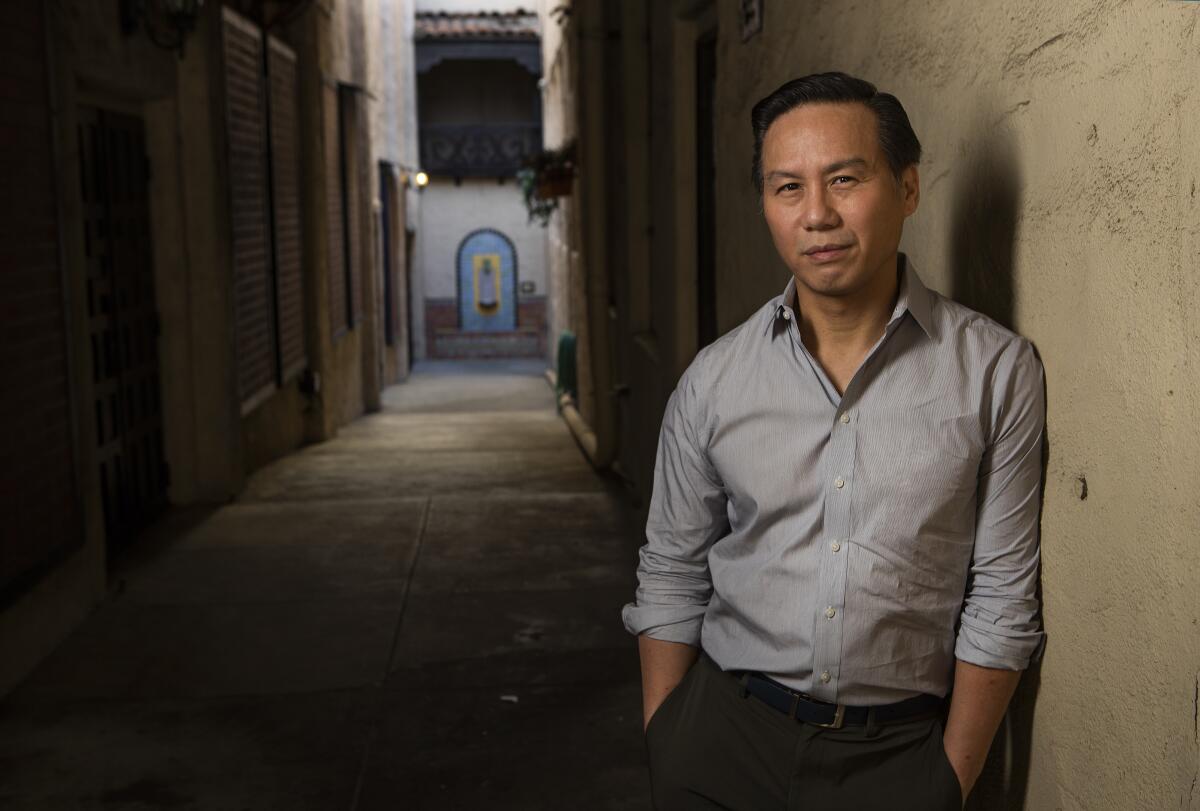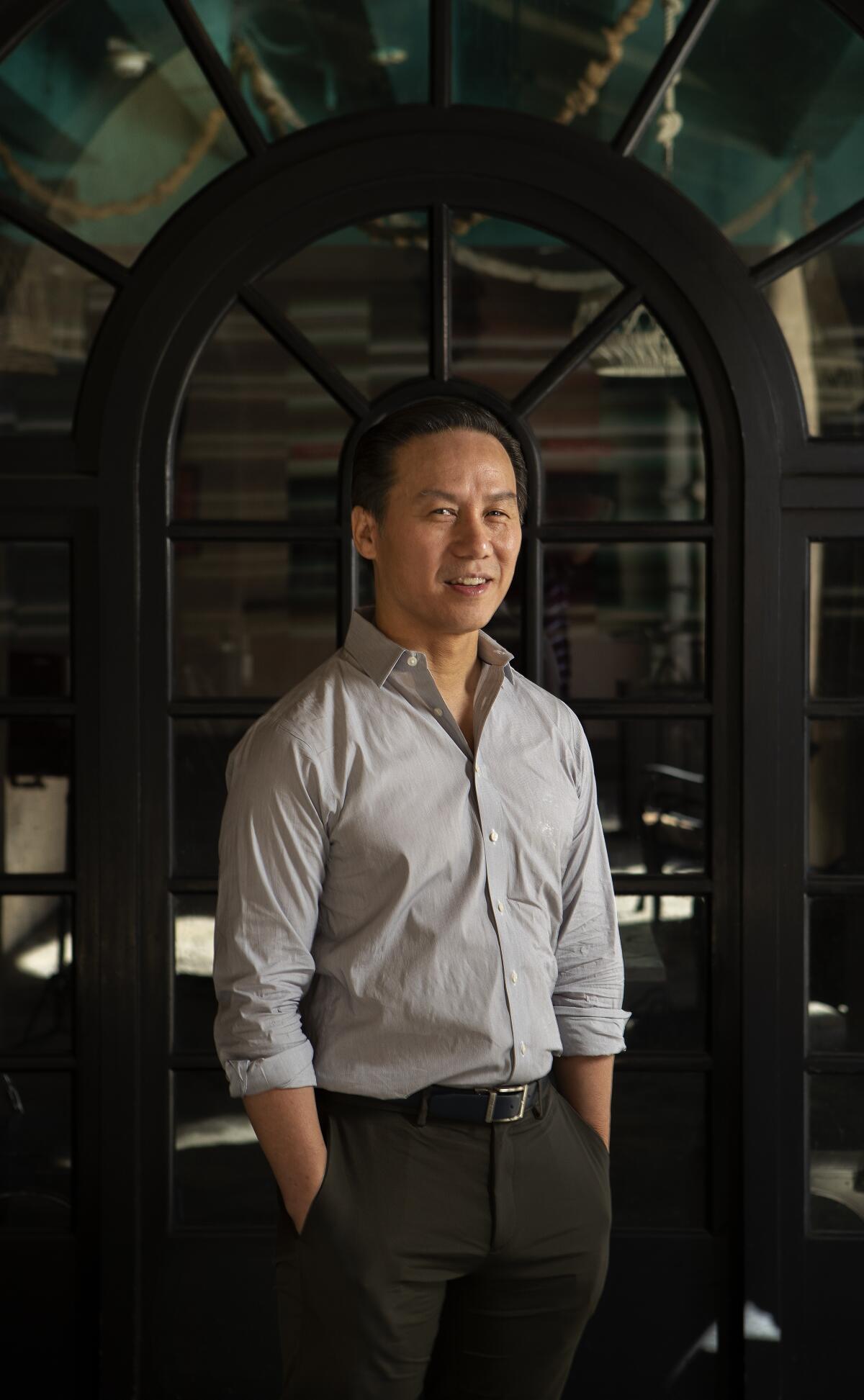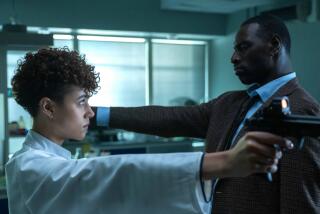BD Wong is taking ‘The Great Leap’ into directing

BD Wong is, once again, deep in rehearsals for “The Great Leap.” The Pasadena Playhouse’s production of Lauren Yee’s play is opening in a few weeks, and the cast is running through its penultimate scene: a U.S.-China exhibition basketball game in 1989. It’s layered and complex and extremely fast-paced — in line delivery and in blocking — and serves as the dramatic climax. The entire sequence spans 20 pages, and actors are flipping through them quickly to keep up with the pace of the scene.
But Wong’s script, lying open on a music stand, remains untouched. Having starred in two previous versions of the play, he knows every line by heart. And this time, he’s calling the shots in his new role: director.
“Very good — very, very good,” he tells the four actors, who stretch and rehydrate and wipe their sweat. “It’s hard, so don’t feel like you have to overact it; just stay on the page and get the blocking in your body first. It sounds dumb, I know. But the general shape feels right to me. The potential is great.”
The same can be said of the Tony-winning Wong and his own “Great Leap,” which is in previews now and opens Sunday. Drawn to the play for its “graceful coming-together of deep emotion and humor,” he first played Wen Chang — an officer of the Communist Party who coaches the China team — last spring in New York, and then reprised the role in San Francisco earlier this year.
The second production was not a transfer of the first; the two were completely separate, with different directors and actors. To star in two independent stagings of the same play, and within such a short period of time, is quite rare and rather unconventional for an actor, especially given what’s required of a theater performer.
“There’s a very protective survival mechanism that happens to an actor in any show, which is that in order to commit fully, you have to convince yourself that what you’re doing is the best version of what it can be,” Wong says. “It becomes your reality and what you think of as the truth. There’s no such thing as anything else. Any acting class will tell you that you have to be 100% in it.”
Last year, Wong was fully committed to Taibi Magar’s take at Atlantic Theater Company’s 98-seat site, sans set pieces or costume changes.
“There’s something nice about the audience being right there, for better and for worse,” Wong says. “If someone is having a slow day and nodding off, you see that and have to process that while performing. On the other hand, you do see people on the edge of their seat, completely engaged. And in a play where I speak directly to them, that’s really nice.”
He was also all in for Lisa Peterson’s sized-up version, mounted at American Conservatory Theater’s 1,040-seat space. “In a bigger theater, you definitely still feel and hear the audience,” he says. “It can be exponentially more powerful, because that small gasp becomes this thing that happens in the whole room.”
Each director prioritized different elements, not only to accommodate each stage’s size (“Any given moment of the play has to be completely reconsidered; it’s like the difference between a close-up and a wide shot in a movie,” says Wong) but also to meet each unique artistic vision.
“It’s a rare opportunity that you get to do the same part with different actors, who each bring their own humanity and energy and idiosyncrasies and sense of humor,” he says. “You have to let go of what you had repeatedly told yourself was your truth about this piece, and open yourself up to new ideas. As challenging as that is, I find it feels really good to do that.”
Wong was approached about taking on a third staging in Pasadena while still starring in it in San Francisco. Though he’d been looking for more opportunities to direct — he previously wrote and directed a play for La Jolla Playhouse’s youth program — his knee-jerk response was not to helm something he’d already acted in twice. But while backstage during subsequent performances, he listened to the ongoing dialogue and let his mind wander.

“I’d release that ‘actor’ commitment for a moment and go, ‘If I did direct this, what would I do?’” he recalls. Even though he still had to play the role as he was directed, he immediately became flooded with new ideas and an unshakable urgency. “I thought, ‘I have to direct this. I have to have this experience. I need to have my perspective shifted completely.’”
Yee is pleased with Wong’s continued relationship with her play. “He’s extremely watchable because he has an incredible amount of vulnerability and humanity onstage, and a generosity of spirit in how he relates to an audience and lets them in,” she says. “He also has such a great concern about getting the details right, and he’s always curious and always learning. And I think that’s what makes him a great director too.”
Rehearsing for the 686-seat Pasadena Playhouse production — presented in association with East West Players — Wong doesn’t explicitly recall his own acting process, so as not to override the individual interpretations of his new cast, but his experiences with the play inform his choices and how he strategically describes actions and delivers notes to his actors.
“The instinct to say, ‘When I said this line, the audience really laughed, and the way you’re doing it, you might not get that laugh,’ but that doesn’t work,” says Wong. “This cast is all different people from whenever I was in it, so there’s no such thing as doing anything the same as the shows I’ve done. Instead, you have to start from the humanity of this cast person and go, ‘What are they bringing to it that I never brought or that I couldn’t bring?’ Being open to that has been healthy and good for me too. I think it would be really toxic, actually, to be any other way.”
When directing his friend and fellow “Mr. Robot” actor Grant Chang, Wong tries only to guide him the same way he does with the other three actors (Justin Chien, Christine Lin and James Eckhouse), even though Chang is taking on the “Great Leap” role Wong played twice.
“Sometimes I’m so intimidated because he knows every single line!” Chang says with a laugh. “Because he has that knowledge from doing two productions, he can see what works and what doesn’t work very quickly. But he’s been really open as a director and he gives me a lot of freedom. He’s helping me encompass everything this character is, even if it means doing something he didn’t do.”
Between run-throughs of the ambitious scene, Wong pauses to gather feedback (“Questions? Comments? What’s constructive for you at this point?” he asks the cast) and offer encouragement. He’s a Phil Jackson or Doc Rivers — coaches who were also players.
“The thing about actors is they’re the instrument they’re playing — they can never put it in a case or walk away from it,” Wong says. “So when you’re giving even a small correction, you have to do it in a way that incorporates their humanity.”
He has acting roles in the upcoming Comedy Central series “Awkwafina Is Nora From Queens” and Universal’s planned “Jurassic Park” film, but Wong hopes to direct more often, in addition to writing. (He’s co-writing a stage musical adaptation of the 1995 film “Mr. Holland’s Opus.”) He admits it’s a leap he was initially hesitant to make.
“I’m kind of kicking myself that I didn’t immediately say, ‘Of course I want to direct this,’” he says, promising to prioritize writing and directing for the stage and the screen. “I’m crossing over into a time in my life where this kind of work is really becoming important to me, and I’m really grateful for the way all of these different productions lined up for me. It’s been an incredible education.”
More to Read
The biggest entertainment stories
Get our big stories about Hollywood, film, television, music, arts, culture and more right in your inbox as soon as they publish.
You may occasionally receive promotional content from the Los Angeles Times.











